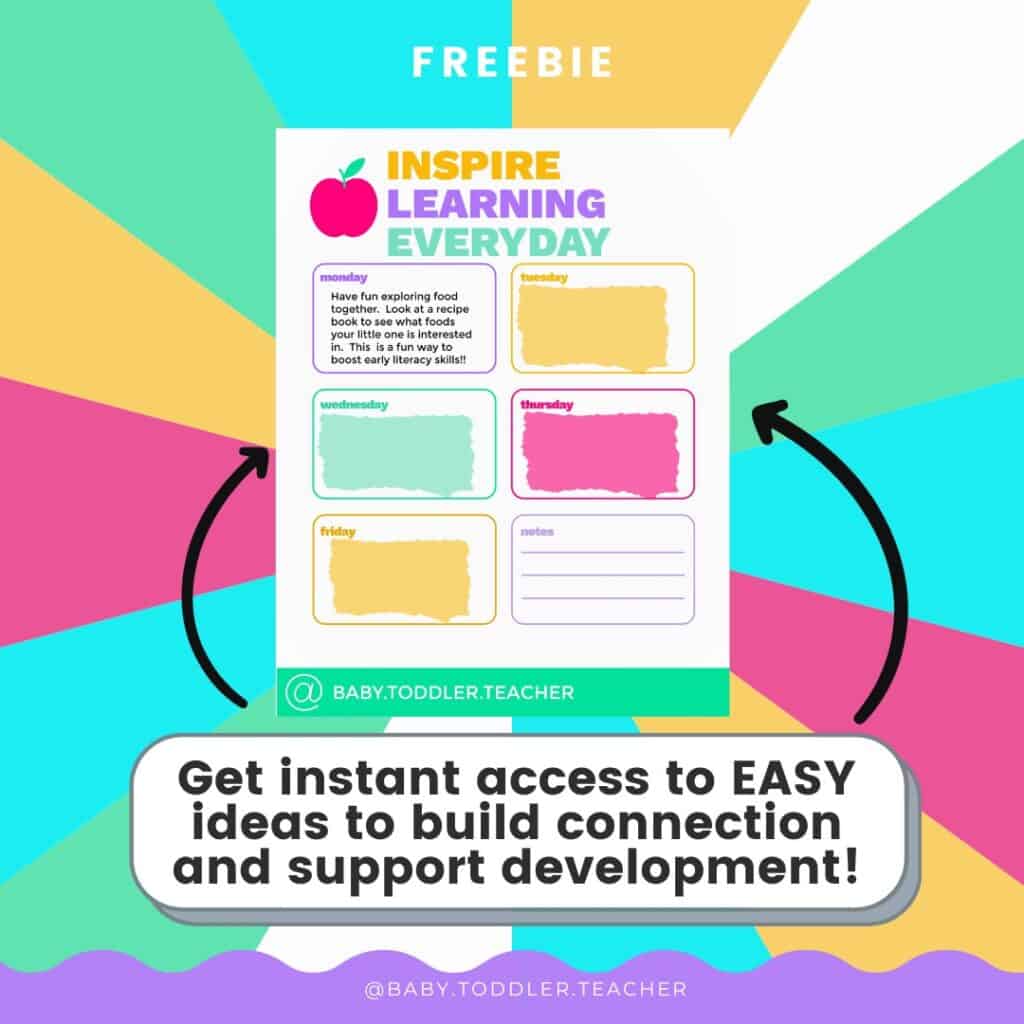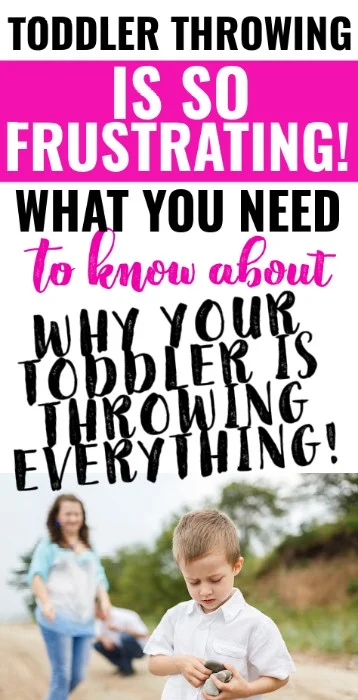
Toddlers throw things for a variety of reasons.
It could be that they are bored, angry, or trying to get attention.
No matter the reason, it can be frustrating for parents when their toddler starts throwing things.
In this blog post, we will discuss why toddlers throw things and what parents can do about it.
We will provide you with strategies and ideas on how to deal with a toddler throwing so that both you and your child can have a calm and peaceful home!
(This post may contain affiliate links. To read our full disclosure policy click here.)
Why is my toddler throwing things?
As I mentioned earlier, there are many reasons why toddlers throw things.
It could be that they are frustrated or angry but don’t have the verbal skills yet to explain how they feel.
Perhaps they are being curious and using it as a way to explore cause and effect.
Sometimes it can even be a sign of boredom – if your toddler has nothing else to do, throwing food, toys, or whatever else they can find can provide them with some entertainment.
It is also important to note that throwing is an important toddler motor milestone!
As a Developmental Therapist, if I were to come to your house and evaluate your child, throwing is something that I would ask about because it is a new and enjoyable skill that your toddler is trying to figure out.
What can parents do to stop their toddlers from throwing things in situations where it isn’t safe or appropriate?
The first step in dealing with a toddler throwing is determining why they are doing it and determining a way to meet their needs.
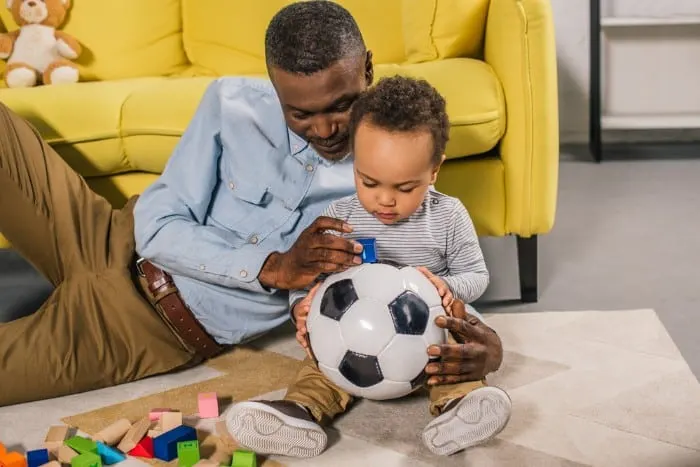
The Benefits Your Toddler Gains From Throwing Things
Although throwing can make us frustrated as parents, it is important to look at it from a child’s perspective to see all that they gain from throwing.
Throwing helps with the development of fine and gross motor skills, hand-eye coordination, and understanding cause-and-effect relationships, and gives them a way to express themselves.
So even though it can be frustrating, try to keep in mind the developmentally appropriate benefits your toddler is gaining from throwing.
Although throwing things is something your toddler will do, let’s talk about ways to address it.
Parents can use a combination of prevention, redirection, and teaching to help their toddlers understand that throwing may not be an acceptable behavior at all times.
How do I get my toddler to stop throwing things?
The first step in getting your child to stop throwing things is to look at why they may be doing it in the first place.
Once you have identified the cause, there are several strategies and ideas you can use to address it.
Throwing things is a skill so we first want to make sure that your toddler has the opportunity to practice throwing objects, balls, or appropriate toys throughout the day.
Avoid using methods like time out or punishments as your child will learn more if you take time to connect and let them practice this developmentally appropriate skill as needed.
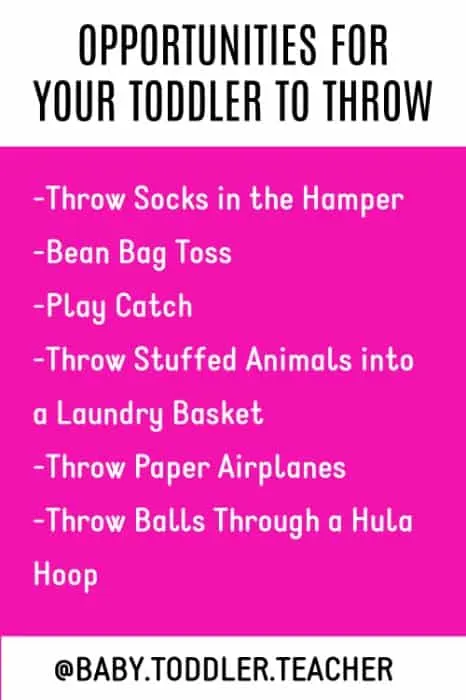
Best Toys for Toddlers Throwing Things Constantly
When it comes to a toddler’s favorite pastime—throwing things—it is worth looking at toys that can provide entertainment while being relatively safe.
Soft foam balls and other plush toys are perfect for young children to toss around as they learn hand-eye coordination.
One of the best toys that we ever bought and used from very early on and my kids still play with to this day (they are now 5 and 7 as I write this) is a ball pit!
My children have used their ball pit (this is similar to the one we have) in so many different ways that it was a great investment.
We love to pull it out when we have been stuck inside or just need to burn some energy.
Another one of our favorites when the kids are in the mood to throw stuff are these foam airplanes.
I have to say my husband and I enjoy these as well and they are perfect for when the weather is nice!
Here are some other toys that may be fun for your toddler who loves to throw things:
Toddler Throws when Frustrated or Angry
For example, if your toddler is throwing because they are frustrated or angry, you will first want to make sure that you remain calm and regulated.
Safety is important so you may need to consider if what your toddler is throwing can be put away so that your child does not hurt themselves or others.
Once that is done, you can provide empathy by understanding their feelings and giving them the words to express them.
You can also provide calming strategies like cuddling, rocking, deep breathing together, or singing soothing songs.
Every child is different so you have to find out what works best for them.
The best time to teach your child how to regulate and calm themselves is during times when they are not upset.
You can work on encouraging social emotional skills through play, modeling, or reading books.
RELATED POST: How to Keep a Two-Year-Old Busy
What to do When Your Toddler is Throwing Food
Most toddlers go through a developmental stage where they like to explore their food with all of their senses, including throwing it.
While this appears to be an amusing activity for the toddler, it can be overwhelming for parents who feel frustrated or embarrassed about the mess caused.
The most important thing to do when your toddler throws food is to remain calm and think about why they may be doing this.
Are they bored?
Are they communicating that they don’t like something?
Once you have figured out why they are throwing it you can then use strategies to address it.
You can read more about what to do when your toddler throws food here.
How to Stop Your Toddler from Throwing Toys
As a parent, it can be extremely trying when your toddler decides to throw his favorite toy.
While addressing this behavior requires age-appropriate discipline, it is important to remember that at this stage of development, toddlers have limited control over their emotions.
Therefore, your primary focus should be on redirecting their emotions and turning the situation into an opportunity to teach them about more appropriate ways of expressing themselves.
Try to remain composed and respond calmly by setting boundaries and explaining (in terms he will understand) why throwing toys is not safe.
You can then either demonstrate to them how to play with the toy in a safe manner or provide them with an alternative activity where throwing is appropriate.
This could be heading outside to throw a ball or if you are inside it could mean throwing socks into the hamper.
If the child consistently throws a toy that is not safe it is time to think about putting it away for a while as your child may not be ready for it.
Toddlers Throwing Things is Frustrating…but Normal!
Hopefully, this post gave you a bit more understanding of why your toddler might be throwing things and some ideas on how to help them find other ways to meet their needs.
Remember, there is no one-size-fits-all approach, so find what works best for you and your family.
We discuss topics like potty training if you’re in the thick of it right now and give you ideas on easy ways to inspire learning with your little one all day long.
There are lots of successes and failures when it comes to raising toddlers, but learning from each other can help reduce the struggles.
So come share your journey with us!

Grab your FREE Milestone Guide HERE.
Frequently Asked Questions
Yes, it is normal for toddlers to throw things as they are still learning how to regulate their emotions and explore the world around them.
Throwing is a motor skill and that is oftentimes why it is so interesting and fun for toddlers.
Teaching your toddler not to throw involves using a combination of prevention, redirection, and teaching.
Parents should make sure that whatever their toddler is throwing is safe and let them have many opportunities to practice throwing throughout the day.
Parents should also use language to explain why throwing is not appropriate in some situations and provide alternatives like tossing a ball outside or other activities where it would be more acceptable to throw.
If your toddler won’t stop throwing things, it could be that they are just not able to regulate their emotions or process the situation.
It is important to maintain a calm and patient attitude when addressing this behavior and remember that at this age, toddlers have limited control over their emotions.
Try providing them with strategies for managing their emotions and appropriate outlets for throwing, such as going outside and playing catch.
Related Posts You Will Enjoy
Strategies to Support Language Development in Toddlers
Sharing and Turn-Taking Activities for Toddlers
Everything You Need to Know About Self-Help Skills for Toddlers
How to Communicate with Toddlers Who Do Not Use Words Yet
How to Get Your Toddler to Listen Without Yelling
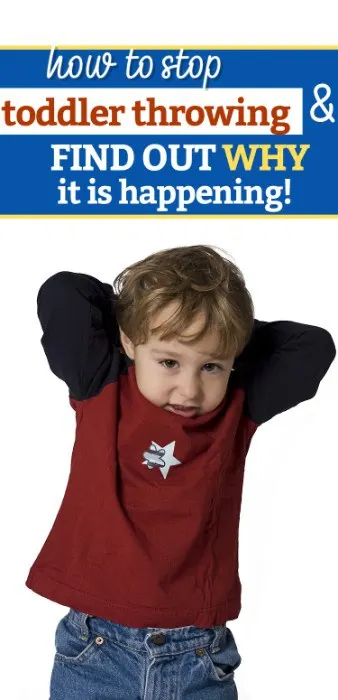

Kayla O’Neill has a master’s degree in education as well as a bachelor’s degree in special education with an emphasis in early childhood education. She has been working as a developmental therapist with babies and toddlers in early intervention since 2012. She is also a mom with two young children.
